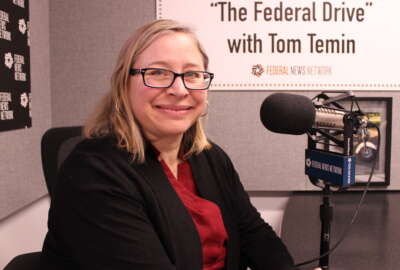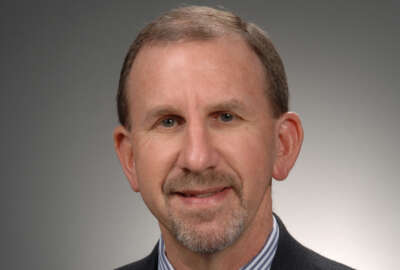
HHS looking for innovative ways to care for the elderly
Not all of the aged have equal access to the care they need. To help improve it, Health and Human Services is asking a wide range of health care providers,...
Best listening experience is on Chrome, Firefox or Safari. Subscribe to Federal Drive’s daily audio interviews on Apple Podcasts or PodcastOne.
Old age often comes with chronic disease. Not all of the aged have equal access to the care they need. To help improve it, Health and Human Services is asking a wide range of health care providers, academics and startups for information and ideas. With more on the effort, the Chief Medical Officer in the HHS Office of the Assistant Secretary for Health, Dr. Leith States, joined Federal Drive with Tom Temin.
Interview transcripts:
Tom Temin: Dr. States, good to have you on.
Dr. Leith States: Thank you for having me Tom.
Tom Temin: Tell us about this effort. You’re trying to reach out, I guess broadly, to get ideas from whom about what?
Dr. Leith States: So to answer the question about about what, essentially we’ve seen a lot of things over the past nine months with COVID. One of those things, obviously, has been a widening gap and acknowledgement that existing disparities in care only get worse when a stress is applied to the system. And that’s been seen on the home of medically underserved ageing populations a bit more than you may have seen in the remainder of the population. So understanding that the government doesn’t have all the tools, all the solutions, all the answers, we turn to the external network of stakeholders that we know have a vested interest to find out what can be done and how can the federal government be performing better.
Tom Temin: And what is your sense of where this type of situation occurs? The underserved, is it simply a rural area or a poor population area? Or can it also happen in urban areas?
Dr. Leith States: So that’s a very good question. And the way you approach that is spot on. Because underserved means different things to different people in different communities. And the RFI was written necessarily with that vague lead in to allow for urban consideration, for rural consideration. Even the middle class having difficulty during this period consideration. It takes all comers, anybody that’s not getting access to the evidence base or the standard expectation of care.
Tom Temin: And I imagine there are also ancillary issues that accompany people in that situation. For example, they might not have enough food, food and security might often accompany, say a health deficit or health care deficit, and they kind of feed on one another.
Dr. Leith States: That’s certainly right. So nothing happens in isolation. And nothing happens independent of a cycle that feeds in from other determinants. Most of the listeners in yourself have probably heard of the social determinants of health. And it’s no mistake that many of these communities that are termed hotspots, or that have a increased proportion of morbidity and mortality related to COVID are in these areas where you may think of having poor infrastructure or investment related to many of the social determinants frameworks.
Tom Temin: So the COVID, then, is sort of a pile on for conditions that might have existed beforehand.
Dr. Leith States: Yeah. It’s one of those situations where if you apply the right stress or apply any stress to the system, you’re going to see what it’s made of, just like with an individual, if you apply a certain stress, you’re going to see what’s underlying. And in many cases, if you have a series of social determinants that have been or a lack of access to certain determinants, your body is going to evidence that your ability to cope with that is going to be evidence. So you’re going to see the increased poor outcomes from that.
Tom Temin: And another way to look at the problem, I suppose, and tell me if this is also how you’re looking at it. There are a myriad of federal programs, some huge, some focused, as well as a huge constellation of health care providers, and a very complex system that we have in the United States. And yet there are these gaps in access to care for certain populations. So are you also looking at it from a program, operational and logistics standpoint, as well as a health standpoint?
Dr. Leith States: I mentioned to you briefly before we came on air that I’d been in the military for 10 years prior to coming to HHS, it’s always for me, when I approach any consideration like this, the strategic operational and tactical, right. So we do have a whole slew of strategic partners that we should be actively engaged with, and doing it in cross cutting ways, that doesn’t always happen, which allows for the classic silos to form and the lackluster performance in terms of what our implementation looks like and the outcomes from that. The partial goal from this is to help increase that cross talk at a very high level. And as you can probably see in the RFI, we went to pretty significant lengths to make sure there was a variety of input and perspectives that contributed to developing it. So we went outside of just HHS because we know health is a consideration in the quality of life and the ability of a person to thrive, but it’s not even close to the only determinant.
Tom Temin: And you mentioned there is a cross government effort component to this. What are some of the other agencies with you on this search?
Dr. Leith States: Sure. As some of our great collaborators have been the Department of Energy, the Federal Communications Commission, the USDA, United States Department of Agriculture. Outside of that we’ve had low level discussions with other agencies, but probably one of the more central executive, I guess you’d call them assistant quarterbacks, to this has been the Office of Science and Technology Policy from the White House.
Tom Temin: And in the reach out, what is it you’re seeking ideas for? How to expand health care coverage? Are you looking for data sets on effects in different states and locales? What are you expecting to get back from all of these recipients of the request for information?
Dr. Leith States: Sure. So the scope on the RFI was necessarily wide from our senior leadership, one of the things we wanted to tease out were what are the long poles in the tent. So what are the barriers keeping many of these innovations from getting to the hands of people that need them most. So if that means looking at programmatic, at policy, at regulatory, at community based organizations at the state level, local level, across the spectrum of not just the patient centered devices, such as biosensors wearables, at base platforms, but even towards as you were speaking to like the data deserts, and the food deserts and things that have an implication on the upstream and getting towards patients being able to do the most with the tools available. That’s what we wanted to hear from. And that’s why it’s not just geared towards health care providers exclusively, we were hoping for non clinicians, non healthcare entities, folks that can really inform the entire landscape from soup to nuts in terms of what’s going on in this space.
Tom Temin: And what happens after all of the data gathering?
Dr. Leith States: Well, after all the data gathering, myself and wonderful team of folks that are gluttons for punishment. We will go through and review submissions, provide some summary reports to senior leadership and principals, and have a second round review performed by the true experts that really have skin in the game as it were on the federal side, that can help inform this into a document, a path forward. That isn’t just something to allow for academic thought, we’re hoping to pull some high quality ideas that can be run forward with in terms of something we can take action on, something we can form a relationship from something that can have impact rather than just going back to the shelf and collecting dust.
Tom Temin: And the leadership team to which you submit all of this information will be different from the one that initiated it as we have a change in administrations? Is this the type of program that will transcend whatever policy changes might happen at the political level as they take over HHS?
Dr. Leith States: So that’s…
Tom Temin: Above your paygrade?
Dr. Leith States: But no, I think it’s it’s obviously an elephant in the room that needs to be addressed, right. I’ve had the good fortune to not only have the support from my existing leadership, and have had the addition of being welcomed warmly by the incoming landing teams. I believe that this is something that speaks to a bipartisan audience. This gets to, I think foundational issues outside of aging outside of COVID that can have an impact across multiple, multiple issues, no matter how you want to frame them, no matter how you are selling them to your given constituency.
Tom Temin: So you have spoken to the transition teams in other words? They’re actually happening and coming through the different agencies including yours.
Dr. Leith States: That’s correct. The floodgates have opened. We are having as far as I can tell peaceful discussions, productive discussions. Things are, I think, moving along in a way that would be called respectful and amicable on both sides.
Tom Temin: Alright. Dr. Leith States is chief medical officer in the Office of the Assistant Secretary for Health at Health and Human Services Department. Thanks so much for joining me.
Dr. Leith States: Thank you Tom.
Copyright © 2025 Federal News Network. All rights reserved. This website is not intended for users located within the European Economic Area.
Tom Temin is host of the Federal Drive and has been providing insight on federal technology and management issues for more than 30 years.
Follow @tteminWFED





